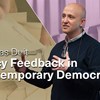representatives
“Most MPs are Not All that Sharp.” Political Employees and Representative Democracy
International Journal of Public Administration, Vol 40 (7), s 548-558 (2017) DOI: http://dx.doi.org/10.1080/01900692.2016.1157693 Abstract The article analyses the orientations of political employees in
"Most MPs are not all that sharp." Political employees and representative democracy
Working Paper 2016 no. 2(Published in International Journal of Public Administration, Vol 40 (7), pp 548-558 (2017) DOI: http://dx.doi.org/10.1080/01900692.2016.1157693) This paper analyses the orient
Spatial Numerical Associations by Modality: the Differences Between Symbolic and Non-Symbolic Numerical Representations
Quarterly Journal of Experimental Psychology 72 (10), 2423-2436 Abstract During the last decades, there have been a large number of studies into the number-related abilities of humans. As a result, we kn
Poor Kids? Economic Resources and Adverse Peer Relations in a Nationally Representative Sample of Swedish Adolescents
Journal of Youth and Adolescence, First online, DOI 10.1007/s10964-017-0747-8 Abstract There is limited knowledge on the impact of economic resources on adverse peer relations during adolescence. This st
Lena Wängnerud: Why Women’s Political Representation affect Levels of Corruption. Trends in Bribery and Public Service Delivery Across European Regions
Venue: Institute for Futures Studies, Holländargatan 13 in Stockholm, or online. Research seminar with Lena Wängnerud, Professor of Political Science at the University of Gothenburg. Her work involves t
Armin Schäfer: Political Inequality. Unequal Participation and Biased Representation
Prof. Dr. Armin Schäfer, Institut Für Sozialwissenschaften, Universität Osnabrück ABSTRACTAs turnout has declined in many developed democracies, it has also become more unequal. Recent studies show tha
Bi Puranen moderates debate at UNESCO
On the 25–26th of March, UNESCO organizes a big international workshop titled "Measuring Social Public Policies: Inclusiveness and Impact" in Paris. The workshop is organized within UNESO's Management

How policy creates politics. Policy feedback in contemporary democracies
Why do political actors find it increasingly difficult to design effective policies and address pressing social problems. This project tries to find the answer in changes of the policy feedback mechanisms by using longitudinal datasets from 30 countries.
Andreas Duit: How Policy Creates Politics: Policy Feedback in Contemporary Democracies
Venue: Institute for Futures Studies, Holländargatan 13 in Stockholm, or online. Research seminar with Andreas Duit, Professor at the Department of Political Science, Stockholm University. Andreas Duit

Andreas Duit: Policy Feedback in Contemporary Democracies
How Policy Creates Politics: Policy Feedback in Contemporary Democracies Research seminar with Andreas Duit, Professor at the Department of Political Science, Stockholm University. Andreas Duit works








